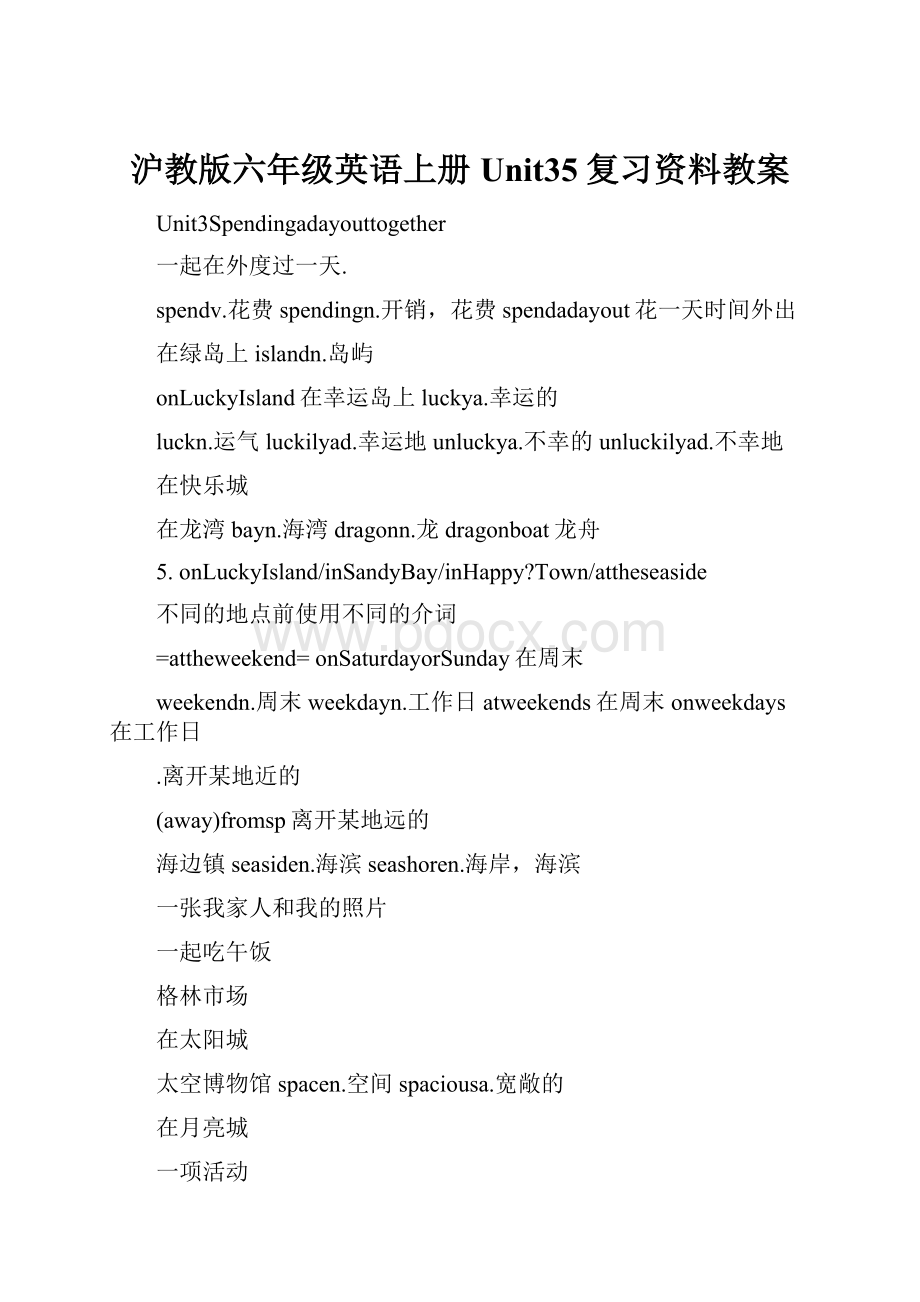沪教版六年级英语上册Unit35复习资料教案.docx
《沪教版六年级英语上册Unit35复习资料教案.docx》由会员分享,可在线阅读,更多相关《沪教版六年级英语上册Unit35复习资料教案.docx(12页珍藏版)》请在冰豆网上搜索。

沪教版六年级英语上册Unit35复习资料教案
Unit3Spendingadayouttogether
一起在外度过一天.
spendv.花费spendingn.开销,花费spendadayout花一天时间外出
在绿岛上islandn.岛屿
onLuckyIsland在幸运岛上luckya.幸运的
luckn.运气luckilyad.幸运地unluckya.不幸的unluckilyad.不幸地
在快乐城
在龙湾bayn.海湾dragonn.龙dragonboat龙舟
5.onLuckyIsland/inSandyBay/inHappy?
Town/attheseaside
不同的地点前使用不同的介词
=attheweekend=onSaturdayorSunday在周末
weekendn.周末weekdayn.工作日atweekends在周末onweekdays在工作日
.离开某地近的
(away)fromsp离开某地远的
海边镇seasiden.海滨seashoren.海岸,海滨
一张我家人和我的照片
一起吃午饭
格林市场
在太阳城
太空博物馆spacen.空间spaciousa.宽敞的
在月亮城
一项活动
activityn.活动actn./v.行为,活动actorn.男演员actressn.女演员
进行一次烧烤
放风筝骑自行车
筑沙堡
收集贝壳collectv.收集collectionn.收集,收集的东西
制作一本照片簿albumn.相册,唱片photoalbum相册
.计划做某事
一个好主意
哪一个地方
计划一次旅行
………怎么样(常用于表示建议或提议)
+v.打算做…
29..=inthemorning.=intheafternoon
一、重点词汇和短语:
计划去做某事,与begoingtodosth的意思相近
.IplantovisitmygrandmathisSunday=Iamgoingtovisitmygrandma.
我打算这个星期天去看望我的外婆。
主语+begoingto+动词原形=主语+will+动词原形,表示一般将来时
.Iamgoingtocollectshells.Iwillcollectshells.
Heisgoingtomakesandcastles.Hewillmakesandcastles
Wearegoingtoflykites.Wewillflykites.
farawayfrom离.近/远
near+地点farawayfrom+地点(不要遗漏介词from)
(be)near=(be)closeto在…附近
(be)farawayfrom=(be)farfrom远离…
.你去了.哪个地方
on我去了.
WherehaveyoubeeninShanghai你到过上海哪里
IhavebeentoCenturyParkinShanghai.我到过上海的世纪公园。
4.letsbdosth让某人做某事
.Let’splayagame.让我们玩个游戏lethimdohishomework让他做作业
5.by+交通工具=takea+交通工具,对交通方式提问用How
bybus=takeabus坐汽车
6.aphotoof…一张…的照片aphotoofme一张我的照片
aphotoofmybrotherandme一张我哥和我的照片。
aphotoof后接人称代词时,应该用宾格形式aphotoofme/him/her/it/us/them
amapof…一张…的地图(of后接宾格)
.amapofChina一张中国的地图
7.主语+be动词(am/is/are)+动词ing,表示现在进行时
.Iamsinging./Sheissinging./Theyaresinging.
)cost以物作主语,通常是问价钱costn.花费costv.花费
.Itcostsabout600yuan.大概600元。
Thecostofthebagis450yuan.这个包的价格是450元。
2)take以it作主语。
通常是花费时间
Ittakesme15minutestogotoschool.
3)spend以人作主语,既可以是花费金钱,也可以是花费时间。
spendtime/moneyonsth.spendtime/moneyindoingsth.
Ispendtwoyuanonthispen.=Ispendtwoyuaninbuyingthispen.
Boysspendalotoftimeinplayingcomputergames.男孩花很多时间玩电脑游戏。
Ispent5dollarsontheice-cream.我花五元钱买了冰激凌。
9.Whichplaceshallwevisit我们将参观哪个地方
arewegoingtocomeback我们将什么时候回来
Comeback回来Begoingto表将来begoingto=will
Whattime提问确切时间;When提问的时间范围更广
我们将怎样到达哪里
How对交通工具进行提问。
回答可以用bybus/car/onfoot
它花费多少钱Howmuch对价钱提问
13.Howabout…怎么样表示建议,提议。
后面接名词或者动词的ing形式
解析:
Howabout+n=Whatabout+n
Howabout+doing=Whatabout+doing。
14.表达提出建议的句型:
Shallwe+动原…/Let’s+动原…
Whatabout+v-ing…/Howabout+v-ing…
回答别人的提议常用:
That’sagoodidea/Allright等
hasbeento和have/hasgoneto
解析:
have/hasbeento曾到过某地(人回来了)
have/hasgoneto去了某地(人没有回来)
Unit4Whatwouldyouliketobe
不同的职业
become想要成为……
一名秘书
一个银行职员
一个女警察
一名牙医
一名飞行员
一个消防队员
一名邮递员
一个商店营业员
教孩子们英语
使病人好转
驾驶一辆公交车
扑灭火
为人们烧食物
使我们的城市(成为)一个安全的地方
.采访某人
查明;弄清(情况)
开始工作
结束工作
afternoon/evening在早上/下午/晚上
为什么不呢
Unit4知识点归纳
1.wouldliketodo/be=wanttodo/be想要做/想要成为
(1)Iwould缩写为I'd;wouldnot缩写为wouldn't,
例如,Iwouldliketohavecoffee.我想要喝咖啡。
Iwouldlikefish.我想要鱼。
----Wouldyouliketobeadriver你想成为一名司机吗
----Yes,Iwould./No,Iwouldn't.是的,我想。
/不,我不想。
注意:
like用作实意动词时翻译为“喜欢”
其用法是例如,Helikestodraw./Helikesdrawing.他喜欢画画。
(spent,spent)花费
spend(time/money)indoingsth.花费时间或金钱做某事,in可以省略
spend(time/money)onsth.花费时间或金钱在某事或某物上,on不可以省略,例如,Weoftenspendanhour(in)doingourhomework.=Weoftenspendanhouronourhomework.我们经常花费一小时做作业。
Hespent200yuanonthiscoatyesterday.
Whynot为什么/为什么不
--Iwouldliketobea/an…,because…我想成为...因为...
--Iwouldn’tliketbea/an…,because…我不想成为...因为...
教孩子英语
.双宾语结构,sb.和sth.都是teach的宾语,sb.是间接宾语,sth.是直接宾语,
如果直接宾语在前,需要加上介词,要注意介词的搭配.
如:
.相同的结构还有,
.=.给某人买某物
.=.给某人某物
.=.给某人看某物
【注】teach后跟人称代词,接宾格。
teachthem/us/me/him/herEnglish
这里的make表示使...
用法有:
make+sb./sth.+adj.使...怎么样例:
makeourcitybeautiful
make+sb./sth.+n.使...成为...makeourcityasafeplace
make+sb./sth.+dosth.使...做...makepeoplesavewater
【注1】这里的better是well的比较级,well只有用于表示身体状况时作形容词,表示身体状况良好。
【注2】sickpeople病人
这里的safe是形容词,表示安全的。
动词save表示挽救,节省,如:
saveone’slife,savewater名词safety表示安全,
如:
talkaboutthesafetyofstudents
这里的putout表示扑灭,动词词组要注意辨析,要注意和put搭配的词组,也要注意和out搭配的词组。
如:
puton/putup/putoff/findout/takeout/lookout
8.辨析findout与find,前者表示经过一番努力调查清楚、弄明白一件事情的真相,而后
者指找到、偶然发现、发觉。
.这里的if表示是否,引导宾语从句。
【注】if也可表示如果,引导条件状语从句。
如:
Wewillhaveapicnicifitisfinetomorrow.
.采访某人
岁
【注】forty-two-year-old42岁的,为形容词,不能用做表语如:
aseven-year-oldboy一个7岁的男孩
Heissevenyearsold.他七岁。
这里的startwork是表示抽象意义上的开始工作,就是上班,所以work前不加冠词,且work为不可数名词。
a)在表示具体时间前用at,如:
atteno’clock
b)表示在一天的上午,下午,傍晚前用in,
如:
inthemorning,intheafternoon,intheevening
c)表示在中午或晚上用at:
atnoon,atnight
d)但是如果表示具体的某一天的上午或晚上要用on,
如:
onthenightofDecember8,onacoldmorningofOctober
.=startdoingsth.开始做某事
如:
Mymotherusuallystartstocookfoodatfive.
(doing)sth.完成(做)某事
如:
Ihavefinishedreadingthisbook.我已经读完这本书了。
Unit5OpenDay
一个开放日
开放日活动安排
一个入口处attheentrance在入口处enter进入(动词)
听一个合唱队(唱歌)
一块布告栏
我的父母亲
在入口处迎接某人
goodtime玩得开心,过得愉快
9.takesomephotos拍一些照片
参观教室
…/Next,…/Then,…/Afterthat,…/Finally,…
首先,紧接着,然后,在那以后,最后Finally=atlast=intheend
看一看我们的班级习作项目
在美术劳技室
在大厅里
intheMusicroom/inclassroom6A/intheArtsandCraftsroom
我们的英语俱乐部
喝茶吃蛋糕
在音乐室
在开放日欢迎父母
在不同的地方
在第一层(英式表达法)
写一封邀请函
知识点
1.arriveat/arrivein/reach/getto到达
arriveat后接小地方arrivein后接大地方
Iarriveatschoolat7:
15.
HewillarriveinShanghaiattwoo’clock.
reach是个及物动词,后面直接接地点名词Ireachschoolat7:
15.
Igettoschoolat7:
15.
注意:
gethome,arrivethere无介词
/begoingto都是用来表将来的,他们后面应该接动词的原形。
will是个情态动词,没有人称的变化.常写成’ll+动词原形
willnot=won’t
I’llinviteallofmyfriends.
HewillarriveinShanghaiattwoo’.
Yourparentswillarriveattwoo’clock.
但是begoingto有人称的变化.
Iamgoingtoinviteallofmyfriends.
Heisgoingtogofishingtomorrow.
Iamgoingtogofishingtomorrow.
Theyaregoingtogofishingtomorrow.
at看;see看见;listento听;hear听见
4.Parent=fatherormotherparents=fatherandmother
5.twofifteen=aquarterpasttwo2:
15
Threeten=tenpastthree3:
10
Onethirty=halfpastone1:
30
twoforty=twentytothree2:
40
6.onthetenthofSeptember/onSeptemberthetenth9月10日
日期表达:
如1987年4月20日
英式的写法是20thApril,1987,读成thetwentiethofApril,nineteeneighty-seven;
美式的表达是April20,1987,则读成Aprilthetwentieth,nineteeneighty-seven。
想要某人做某事
IwantyoutoreadEnglisheveryday.我想要你们每天都读英语。
8.inthesameplace/indifferentplaces
9.invite邀请(动词)invitation邀请(名词)
invitesbtosp邀请某人去某地
Sheinvitesmetoherbirthdayparty.她邀请我去她的生日晚会。
10.词性转换:
enterv.–entrancen.,meetv.–meeting(s)n.,invitev.–invitationn.
finala.–finallyad.,
actv.–discussv.–discussionn.,
.–artn.–artistn.,
teachv.–teachern.(teachers’office)
Unit5重点
1.介词+时间:
at+具体时间点,
如athalfpasteleven(=ateleventhirty);atnight,atnoon,atChristmas
in+月/季节/年,
如inFebruary,inautumn,in2012;inthemorning/afternoon/evening
on+具体的一天,如onThursday,onDecember23rd;onSundaymorning
onthemorningofJune1st,onChristmasEve,ontheOpenDay…to…从…到…:
.fromninetwentytotenthirty-five
2.不及物动词必须+介词+宾语
listentome,arriveatthebusstop,lookattheprice,thinkaboutthequestion,etc.
3.一般过去时:
动词过去式:
规则动词+ed:
.played,planned,studied发音有/d/,/t/,/id/
不规则动词:
meet–met,have/has–had,take–took,go–went,am/is–wasare–were,
do–did,speak–spoke,say–said,come–came,see–sawteach–taught,
catch–caught,bring–brought,buy–bought,get–gottell–told,
spend–spent,cost–cost,spread–spread,read–read,etc.
常见时间状语:
yesterday,yesterdaymorning,lastFriday,…ago,justnow,etc.
4.楼层表示法:
onthe+序数词+floor
onthegroundfloor,onthefirstfloor,onthefifteenthfloor
常考序数词:
first,second,third,fourth,fifth,eighth,ninth,twelfth,twentieth,fortieth,etc.
5.系动词+a.构成系表结构
感官动词:
look,sound,taste,smell,feel+nice/terrible,etc.
getangry,turnred,gowrong,stayhealthy,becomepopular,etc.